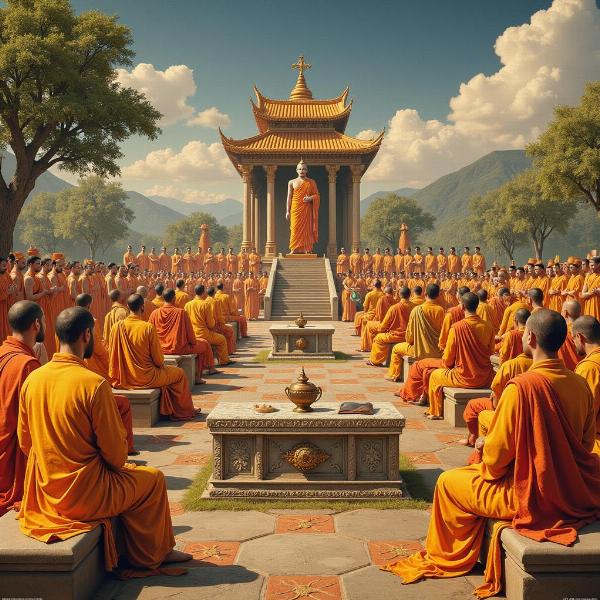Kanishk meaning in Hindi is often associated with greatness, power, and a golden age. The name itself evokes a sense of historical importance and cultural richness, especially given its connection to the Kushan emperor, Kanishka the Great. Understanding the meaning and context of “Kanishk” requires delving into the history of the Kushan Empire and its impact on Indian culture, language, and Buddhism. This exploration will reveal the depth and significance behind this powerful name.
The Historical Significance of Kanishk
Kanishka I, often referred to as Kanishka the Great, was one of the most prominent rulers of the Kushan Empire. His reign, beginning around the 2nd century CE, marked a period of significant expansion and cultural flourishing. The Kushan Empire, under Kanishka’s rule, stretched across vast territories, including parts of present-day Afghanistan, Pakistan, and northern India. This geographical influence played a crucial role in shaping the cultural and religious landscape of the region.
The name “Kanishk” is believed to have origins in various languages and interpretations. Some scholars suggest it might derive from a Sanskrit word meaning “handsome” or “attractive.” Others connect it to words signifying “powerful” or “king.” Regardless of the precise etymology, the name has become synonymous with the emperor’s legacy and the grandeur of his era.
Kanishk and the Fourth Buddhist Council
Kanishka is renowned for his patronage of Buddhism. He played a pivotal role in convening the Fourth Buddhist Council, a significant event in Buddhist history. This council, held in Kashmir, aimed to resolve doctrinal disputes and establish a more unified understanding of Buddhist teachings. The council’s decisions had a lasting impact on the development of Buddhism, particularly in the Mahayana tradition.
 Fourth Buddhist Council under Kanishka
Fourth Buddhist Council under Kanishka
Kanishk’s Impact on Art and Culture
The reign of Kanishk witnessed a flourishing of art and culture. The Gandhara school of art, known for its Greco-Buddhist sculptures, reached its peak during this period. These sculptures, depicting Buddha and other Buddhist figures, reflect the cultural exchange and artistic innovation that characterized Kanishka’s empire.
Kanishk in Modern India: A Name of Significance
Today, the name “Kanishk” continues to be a popular choice for boys in India. It carries with it the weight of history and the connotations of strength and wisdom. Parents who choose this name for their children often do so with the hope that they will embody the same qualities of leadership and intellectual curiosity that defined the emperor.
Kanishk: More than just a name
Understanding the kanishk meaning in hindi requires appreciating its rich historical context and cultural significance. The name represents not only a powerful emperor but also a period of cultural exchange, artistic innovation, and religious development. It continues to resonate in modern India, signifying strength, wisdom, and a connection to a glorious past.
FAQ:
- What is the meaning of Kanishk? The meaning is debated, but it is associated with concepts of handsomeness, power, and kingship, ultimately linked to the Kushan emperor Kanishka.
- Who was Kanishka? Kanishka was a powerful Kushan emperor known for his patronage of Buddhism and his vast empire.
- Why is Kanishk important in Buddhist history? Kanishk convened the Fourth Buddhist Council, a pivotal event that shaped the development of Buddhist doctrines.
- What is the Gandhara school of art? The Gandhara school of art, flourishing during Kanishka’s reign, is known for its Greco-Buddhist sculptures.
- Is Kanishk a common name in India today? Yes, it remains a popular name for boys, carrying historical and cultural significance.
- What does the name Kanishk symbolize? It symbolizes strength, wisdom, leadership, and a connection to a rich historical legacy.
- Where can I learn more about the Kushan Empire? Many historical resources, both online and in libraries, offer detailed information about the Kushan Empire and Kanishka’s reign.
Meaning-Hindi.in is your trusted partner for all your Hindi translation needs. We offer a comprehensive range of translation services, including business and commercial document translation, certified and legal document translation, technical and user manual translation, website and localization translation, educational and academic document translation, and specialized industry translation. Our expert team delivers accurate, culturally sensitive, and high-quality translations tailored to your specific requirements. Contact us today for a personalized quote! Email: [email protected], Phone: +91 11-4502-7584. Meaning-Hindi.in provides professional Hindi translation services for various fields, ensuring accuracy and cultural sensitivity. Connect with us for all your translation requirements!